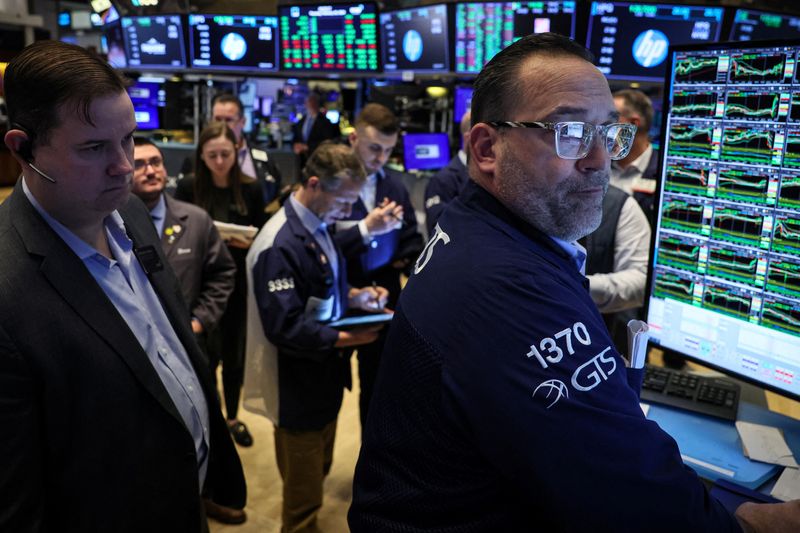A look at the day ahead in U.S. and global markets from Mike Dolan
A new month and new stock market records are giving way already - underpinned by some relief on inflation, stabilising business surveys worldwide and slightly more dovish central banks.
Wall St's major indexes clocked new record closes on the final day of February and March kicked off with fresh highs for Japan's Nikkei and Germany's DAX.
With U.S. futures pushing higher ahead of the open again, MSCI's all-country index looks poised to take out last week's all-time peak later on Friday. The VIX volatility gauge is back down to three week lows.
The Nikkei has now notched up gains of almost 20% since the start of the year, while U.S. and German benchmarks are up 6-7% for the first two months. LSEG data showed investors bought a net $6.98 billion of global equity funds during the week, more than reversing the prior week's net withdrawal of $2.9 billion.
Stock market momentum still seems powerful, even if U.S. disinflation momentum seems to have stalled somewhat.
January's keenly-awaited PCE inflation gauge on Thursday showed annual headline and 'core' inflation rates ebbing further - but 6-month annualised rates popped back as high as 2.5% from just under the Federal Reserve's 2% late last year.
The monthly price pop was in line with forecasts however, fueled by some January and weather-related quirks. And Fed officials seemed more inclined to emphasise their belief that interest rate cuts are still coming later this year rather than simply their patience in executing them.
A parade of top Fed officials on Thursday all looked minded to see through any bump in the disinflation road and restated their confidence in being able to ease policy in 2024.
"I do expect us to cut interest rates later this year," New York Fed chief John Williams said overnight. It "makes sense with inflation coming down, the economy being in better balance, that we're going to move interest rates back to more normal levels."
With futures markets having already halved full-year rate cut expectations since the start of the year to some 80 basis points, and having pushed back the timing of a first cut to June or July, the latest twists were welcomed with some relief.
Treasury yields have been calmed and are well off February highs. The dollar seems serene too.
The yen's jump on Thursday was quickly reversed overnight as speculation of an imminent Bank of Japan policy tightening was doused once again.
BOJ boss Kazuo Ueda pushed back on more hawkish comments from one of his deputies this week and said it was too early to conclude that inflation was sustainably meeting the 2% inflation target. "I don't think we are there yet," he said.
February 'core' inflation numbers from the euro zone, meantime, were a little sparkier than many had hoped for. Although headline rates fell again, much like U.S. readings, underlying price gains that strip out volatile food and fuel only declined to 3.1% from 3.3% - missing a 2.9% forecast.
There was little reaction in euro or euro zone government debt markets, where the spread between Italian 10-year yields and German benchmarks briefly fell to their lowest in two years earlier.
China's tentative stock market recovery also continued on Friday. Even though China's manufacturing activity in February contracted for a fifth straight month, investors are awaiting next week's National People's Congress for signs of a spending package to aid real estate and manufacturing or handouts to households to boost consumption.
Short positions in Chinese stocks shrank by a third last month to their lowest in more than three years, reflecting measures by regulators to curb speculation. China's securities watchdog last month suspended brokerages from borrowing shares for lending to short-sellers and investors were banned from short selling stocks bought on the same day.
But the United States said it's opening an investigation into whether Chinese vehicle imports pose national security risks and could impose restrictions due to concerns about "connected" car technology, the White House said on Thursday.
In company news, cloud firm Snowflake (NYSE:SNOW)'s 18% share price plunge on Thursday was offset with better earnings news from Dell (NYSE:DELL) and NetApp (NASDAQ:NTAP) overnight - and both share prices have surged about 20% before Friday's open.
Elsewhere, the Swiss National Bank said its Chairman Thomas Jordan will step down at the end of September, leaving three years early after over a decade at the helm marked by crises including Credit Suisse's collapse and a supercharged franc.
Key diary items that may provide direction to U.S. markets later on Friday:
* U.S. Feb manufacturing surveys from ISM and S&P Global, University of Michigan's final Feb consumer sentiment reading
* Federal Reserve Board Governors Christopher Waller and Adriana Kugler, Dallas Fed President Lorie Logan, Richmond Fed President Thomas Barkin, Atlanta Fed chief Raphael Bostic, San Francisco Fed chief Mary Daly and Kansas City Fed chief Jeffrey Schmid all speak; Bank of England Chief Economist Huw Pill speaks

* U.S. President Joe Biden meets Italian Prime Minister Giorgia Meloni in Washington. German Chancellor Olaf Scholz meets Italian President Sergio Mattarella in Rome. U.S. Treasury Secretary Janet Yellen visits Chile
* U.S. corp earnings: EchoStar, RadNet etc
(By Mike Dolan; Editing by Toby Chopra mike.dolan@thomsonreuters.com)